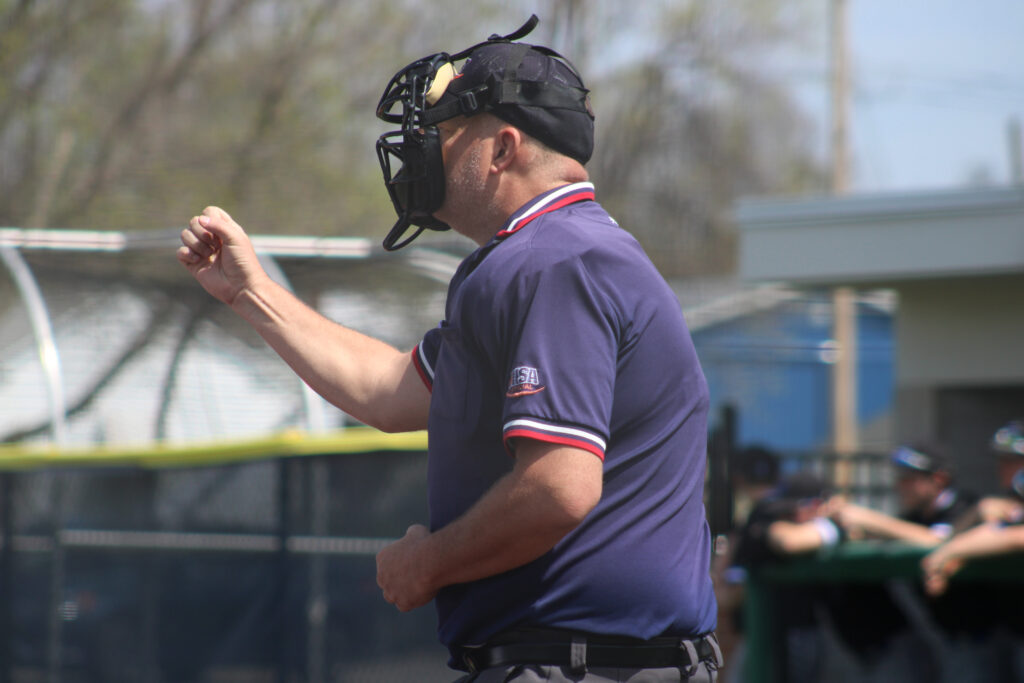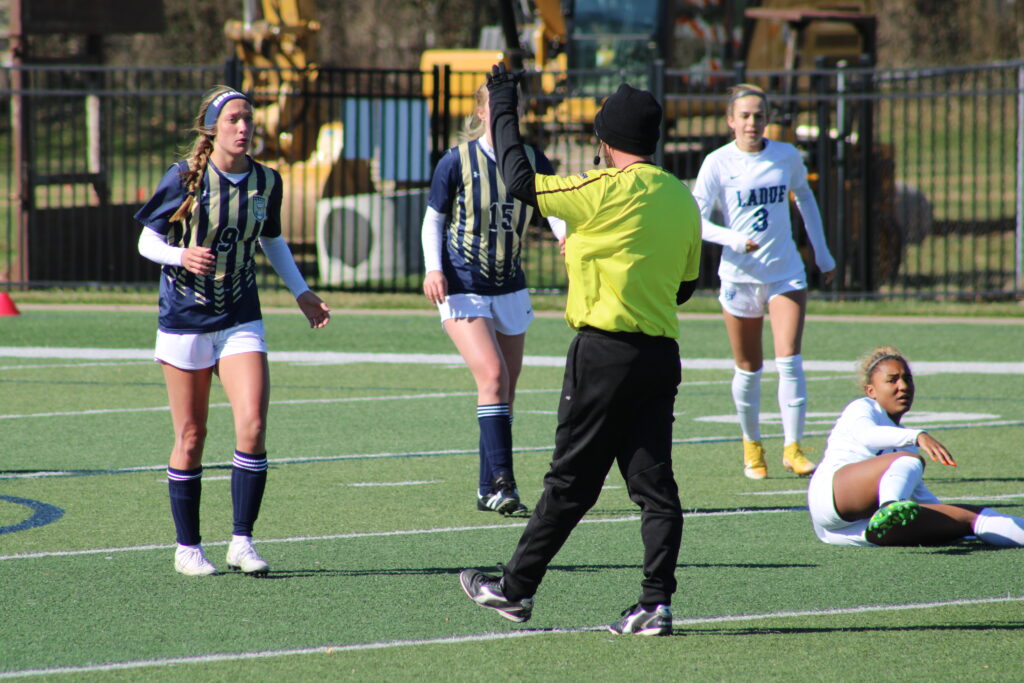Crim: Scarcity of officials across prep sports is concern that continues getting worse

QUINCY — During most of his tenure as athletic director at Quincy Notre Dame, Bill Connell followed a familiar routine.
Find opponents for the school’s various athletic programs, determine mutual open dates to schedule games and then hire crews to officiate them.
That’s not the case anymore.
“You have to find officials first and then lock in a team,” Connell said.
“I never would have believed when I was getting into athletics 27 years ago that we would be in the position we’re in now. We used to have an everlasting list of officials. If somebody couldn’t work, there were another 25 to 30 names to go to just in the Quincy area.
“It’s changed dramatically. Now we have to play games when we can get officials. We’ve played basketball games on Monday nights and Wednesday nights. We have two Saturday afternoon home football games next fall because that’s when we could get five-man crews. You can’t find officials for baseball and softball rainouts. It’s become very difficult.”
The shortage of officials for high school and middle school sports has been a growing concern nationally for several years, in large part due to unsportsmanlike behavior by parents and other adult fans.
A survey released in 2020 by the National Association of Sports Officials found that 57% believed sportsmanship was getting worse, a trend respondents said was caused primarily by parents and coaches, and that 80% of officials quit after their second year.
Additional sports officials elected to stay on the sidelines because of health concerns related to COVID-19, or they were uncomfortable wearing a mask during games. Others have quit because of age or wear and tear on their bodies, and the pipeline is not being replenished quickly enough.
The scarcity of officials is a problem that is not going away anytime soon.
To help combat it, the Illinois High School Association is conducting a free Officiating 101 clinic from 7 to 9 p.m. Wednesday in the QND cafeteria.
Anyone interested in officiating any IHSA-sponsored sport will be able to hear why people enjoy officiating and learn about the IHSA licensing process, the cost for apparel and equipment, how to schedule games and the financial aspects.
“We need people to step up,” said Keith Gerhardt with the Western Illinois Soccer Officials Association. “If you enjoy sports, it’s time to give back — not for you, but for the kids playing now, for your kids, for your grandkids. You can’t play games without officials.
“If you do it just for the money, it’s not worth it. You do it for the enjoyment of the game and to give back to the sport. It’s a noble exercise.”
Gerhardt began officiating 26 years ago when he was approached about working youth games while coaching his sons in the Quinsippi Soccer League. He had umpired baseball while serving in the Marine Corps, he liked soccer and thought it would be a good way to help.
Now 66 and retired, he normally works 40 to 50 high school matches in the spring and another 40 to 50 high school and college matches in the fall — a number that rose significantly last year because the pandemic moved fall sports to the spring.

His association handles high school matches for Quincy High School and Notre Dame in Illinois, and Hannibal and Canton in Missouri. The association has just 11 licensed officials and the average age is 60. Two plan to retire at the end of the spring season because of age and Gerhardt admits he probably has “an expiration date of a couple of years.”
Ideally, a soccer match will have a head referee and two linesmen. The referee working the middle can make $95 a match, a linesman $70.
However, at times, because of the volume of games and the availability of officials, only two are used, which increases the pay and the workload. In the Metro East area, some matches are being officiated with a single referee.
Gerhardt recently worked all six matches in a round-robin tournament in Hannibal because he was available, and some others weren’t.
“I can’t say we have a problem with abuse here,” he said. “Granted, there’s always that one parent with a vested interest watching the game with their heart and not their mind who crosses the line, but high school coaches are held accountable by their athletic directors and administrations. I can’t say enough about the support we get from schools.
“We have a mentoring program to work with young officials. We never make them do the middle until they’re ready. We want them to succeed.”
Mark Brassfield played football at QHS and Quincy University and was at one time the athletic director at Liberty High School charged with hiring officials. Liberty doesn’t field a football program, so it worked well with his schedule.
He began officiating 15 years ago. Now 48 and president of the Quincy District Football Officials Association, he says there are 15-16 officials to cover seven schools in Illinois and another handful in Missouri, down 50 percent from when he started.
“People move out of town, a couple of guys retired, others decided it was not for them anymore,” he said. “If we can get an official to last three years, we figure we can get them to stay. But first, we have to get them to sign up and then get them to Year 3.”
Sportsmanship — or lack of it from some coaches, players and fans — is a major stumbling block for retention.
“I get it, coaches are trying to do their jobs,” Brassfield said. “We have good coaches who ask a question and move on. Then there are coaches who question a call in the first quarter and are still talking about it in the second quarter, the fourth quarter, and then wonder why we’re not focusing on the game.
“I have never seen a coach coach a perfect game or a player play a perfect game. We’re not perfect either.”
High school football is officiated by a five-man crew. Do the math and that means there are only three full crews available on a Friday night in the Quincy area. Sometimes officials from other areas are brought in to augment those available locally to cover more games. Or some games are moved to Saturdays.
“The pay is not that great in Illinois,” Brassfield said. “You may do a varsity game and get $80. Go to Missouri and you get $110 to $115, plus they pay mileage for one person, and we try to ride together.
“It’s a great part-time job for a young kid. You get to pick and choose when you want to work. Some schools pay you on the spot. You’re building friendships. My crew, we’re family. And it’s a good way to give back to the sport.”
He said the average age of a football official in Illinois is 52 and most in the Quincy area have been officiating for an average of 15 to 20 years — some like Fred Steinway and Doug Elledge for 40 or more.
A starter package for attire runs about $100, not counting shoes. The IHSA has a $60 registration fee, although Brassfield said he can get a waiver for the first year for two new officials each year.
The high school football regular season lasts nine weeks in Illinois, but that includes games from fifth and sixth grade up to varsity. That can mean 50 or more dates each season, sometimes more than one game per day, or 70 to 80 games each fall.
And some, like Brassfield, also work college games on Saturdays.
It’s a juggling act.
“Last year, both Quincy and Mendon wanted to schedule JV games on the same night,” Brassfield said. “We got Quincy to start its game at 4:30 and Mendon its game at 6:30. We did the first game in Quincy and then drove to Mendon in our uniforms to do the second game.
“You do what you can do to get games in.”
Todd Reichert will be starting his 30th season as a high school basketball referee next winter. He played basketball through his freshman year at Quincy High School and then began refereeing intramural games while attending Quincy University. He also worked adult league games for the Quincy Park District.
“It was a way to stay in shape and make a little extra money,” he explained.
Reichert said there are about 40 officials in the Quincy Basketball Officials Association, or the equivalent of about 13 three-man crews. He said that’s down about 15 percent.
“Covid really took a toll on us, having to wear a mask while running up and down the court and blowing a whistle,” he said. “Some guys decided they were not going to do that and have not come back. They’re telling me they don’t miss it, that they are enjoying their time off and not getting yelled at.
“Unless there’s a huge influx (in officials) in this area in the next five to 10 years, I don’t know what they’re going to do. Let’s be honest, none of us are getting any younger, and the more games you do increases the chances of your body breaking down.
“I was working five, six nights a week when I first started. Now, most guys only want to work 2-3 nights a week. We have to give in to age, our bodies and other things we want to do.”
Like other sports, basketball officials work games from fifth grade up to varsity. Reichert said they can earn $65 to $90 working two junior high games, the same amount for a varsity game and up to $120 for doing both a junior varsity and varsity game.
“Therein lies another problem,” he said. “Guys don’t want to work games for lower-paying schools. And I’m anticipating there will be an even harder time this basketball season because guys may limit how much they want to travel with gas being $4 a gallon.”
Plus, doing two games back-to-back is not ideal physically.
“A lot of guys feel like they’re not as good the second game,” Reichert said. “But if you burn two crews in one place on a night, it adds up. We have more games than we have officials.
“And if you’re working a JV game and have an issue with a coach or fan and have to turn right around come out for the varsity game, you have a problem before the game even starts.”
Some smaller schools with low player numbers have opted to play varsity games first, when players and officials are fresh, followed by a shortened JV game. Some schools staggered starting times for first-round regional girls games scheduled in different cities last season so a single crew could work both.
“Schools are trying to help out,” Reichert said. “But JV games are to help develop kids, so you hate to cut them short.”
Unruly fans continue to be a problem.
“People take it too seriously,” Reichert said. “At the end of the day, it’s a high school basketball game. It’s an activity that’s supposed to be teaching kids something other than winning is the most important thing in the world.
“They tell us at classes and stuff I go to that we have to realize people are not yelling at us personally but at the uniform. Well, I don’t yell at police officers because of their uniform.”
Despite drawbacks, Reichert, now 58, still enjoys officiating, sees it as a rewarding experience and would like for more people to get involved.
“As far as shiny objects to hang out there for new officials, there’s not a lot,” he said. “You can go to McDonald’s at $15-an-hour and make as much in a four-hour time frame as you would doing a couple of junior high games, and probably not get yelled at as much.
“The good things about officiating are mostly intangible. You get to meet good people, there’s the guys you get to work with, and you give back so kids are able to play a sport and learn valuable lessons.”
Miss Clipping Out Stories to Save for Later?
Click the Purchase Story button below to order a print of this story. We will print it for you on matte photo paper to keep forever.
